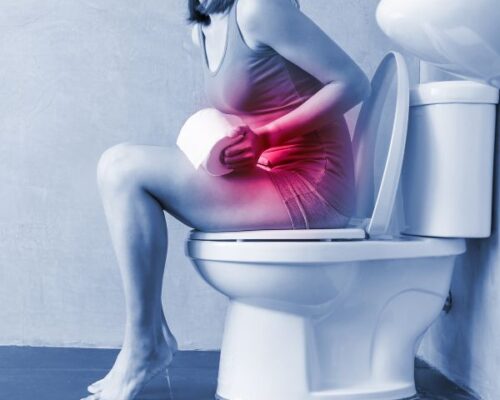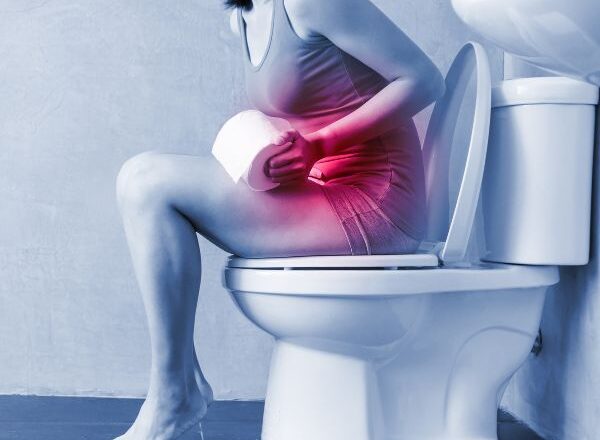Can haemorrhoids cause constipation?
Find out if haemorrhoids can potentially cause constipation.
Can haemorrhoids cause constipation?
Find out if haemorrhoids can potentially cause constipation.

What are haemorrhoids?
Haemorrhoids are relatively common, with an estimated 4.4% of the global population experiencing them. Research from the HD Treatment Centre shows that among those over 45, haemorrhoids affect 25% of women and 15% of men, with men being more likely to seek medical treatment.
Haemorrhoids are swollen veins that develop either internally (inside the rectum) or externally (around the anus). Symptoms often include itching, discomfort, swelling, and occasional bleeding.
Common causes and triggers of haemorrhoids
- Straining during bowel movements
- Sitting for long periods
- Chronic constipation or diarrhoea
- Pregnancy and obesity
What are haemorrhoids?
Haemorrhoids are relatively common, with an estimated 4.4% of the global population experiencing them. Research from the HD Treatment Centre shows that among those over 45, haemorrhoids affect 25% of women and 15% of men, with men being more likely to seek medical treatment.
Haemorrhoids are swollen veins that develop either internally (inside the rectum) or externally (around the anus). Symptoms often include itching, discomfort, swelling, and occasional bleeding.
Common causes and triggers of haemorrhoids
- Straining during bowel movements
- Sitting for long periods
- Chronic constipation or diarrhoea
- Pregnancy and obesity

What is constipation?
Constipation, another widespread condition, affects about 16% of the world’s population, with rates rising to 33.5% in adults aged 60 and above. Nearly 12% of people self-report experiencing constipation at some point.
Constipation usually occurs when bowel movements become infrequent or difficult to pass. It often leads to symptoms such as hard stools, abdominal discomfort, and a feeling of incomplete evacuation.
Contributing factors to constipation
- Low fibre intake
- Inactivity or dehydration
- Conditions like (IBS)

What is constipation?
Constipation, another widespread condition, affects about 16% of the world’s population, with rates rising to 33.5% in adults aged 60 and above. Nearly 12% of people self-report experiencing constipation at some point.
Constipation usually occurs when bowel movements become infrequent or difficult to pass. It often leads to symptoms such as hard stools, abdominal discomfort, and a feeling of incomplete evacuation.
Contributing factors to constipation
- Low fibre intake
- Inactivity or dehydration
- Conditions like (IBS)

What is the link between haemorrhoids and constipation?
Can haemorrhoids cause constipation? The relationship between these two conditions is often bidirectional. In many cases, individuals with haemorrhoids may avoid bowel movements due to the associated pain and discomfort, which can lead to constipation.
Additionally, people with haemorrhoids may delay going to the bathroom out of fear of worsening their symptoms. This avoidance can result in harder stools and make bowel movements even more painful.
On the other hand, constipation can exacerbate haemorrhoids by increasing straining during bowel movements. The longer stool remains in the intestines, the harder it becomes, making it more likely to cause irritation or swelling in the rectal veins.
What are the symptoms to watch out for?
It’s essential to recognise when haemorrhoids and constipation might be interacting. Here are some warning signs to monitor:
- Persistent abdominal discomfort or bloating
- Blood in the stool or on toilet paper
- Pain during or after bowel movements
- Constipation lasting more than a few days
If you experience severe symptoms—such as significant bleeding, extreme pain, or long-term constipation—it’s important to consult a healthcare provider for further evaluation.
What are the treatment options for haemorrhoids and constipation?
Several effective treatments are available to manage haemorrhoids and constipation, depending on the severity of the symptoms.
Home remedies for haemorrhoids and constipation relief
- Increasing your intake of fruits, vegetables, and whole grains
- Drinking plenty of water to prevent the formation of hard stools
- Soaking the affected area in warm water to reduce swelling
- Using over-the-counter topical medication to soothe irritation
- Short-term use of laxatives can help with constipation

Medical procedures for severe haemorrhoids
In cases where haemorrhoids cause significant discomfort or do not respond to home remedies, treatments such as rubber band ligation, sclerotherapy, or haemorrhoidectomy may be recommended by your doctor.
How to prevent haemorrhoids and constipation
Prevention plays a crucial role in managing these conditions. Adopting healthy habits can minimise the chances of haemorrhoids and constipation occurring.
Lifestyle changes to prevent both conditions
* Aim for a diet high in fruits, vegetables, and whole grains
* Drink plenty of water throughout the day and stay hydrated
* Physical activity promotes healthy bowel movements
* Avoid straining and don’t delay going to the toilet
By following these preventative measures, you can lower the risk of developing haemorrhoids and constipation, improving your overall well-being.
Consult a gastrointestinal specialist today
Can haemorrhoids cause constipation? They could. If you are experiencing discomfort from haemorrhoids, consulting a specialist in Sydney can provide the professional care you need. With tailored treatment plans designed to address your specific symptoms—whether pain, itching, bleeding, or swelling—expert guidance can help you achieve lasting relief.
Management often involves a comprehensive approach, combining dietary modifications, lifestyle adjustments, and advanced medical interventions to alleviate symptoms and minimise recurrence. Don’t allow haemorrhoid discomfort and other common gastrointestinal symptoms to affect your daily life—schedule a consultation with a specialist in Sydney today and take the first step towards effective, long-term relief.

Consult a gastrointestinal specialist today
Can haemorrhoids cause constipation? They could. If you are experiencing discomfort from haemorrhoids, consulting a specialist in Sydney can provide the professional care you need. With tailored treatment plans designed to address your specific symptoms—whether pain, itching, bleeding, or swelling—expert guidance can help you achieve lasting relief.
Management often involves a comprehensive approach, combining dietary modifications, lifestyle adjustments, and advanced medical interventions to alleviate symptoms and minimise recurrence. Don’t allow haemorrhoid discomfort and other common gastrointestinal symptoms to affect your daily life—schedule a consultation with a specialist in Sydney today and take the first step towards effective, long-term relief.

FAQs
Can sitting on hard surfaces cause haemorrhoids?
While sitting on hard surfaces does not directly cause haemorrhoids, it can worsen the symptoms for those who already have them by increasing pressure around the anal area.
How do I know if my constipation is caused by a medical condition?
If constipation persists despite dietary and lifestyle changes, it may be related to an underlying condition such as irritable bowel syndrome (IBS) or hypothyroidism. A healthcare provider can help diagnose the cause.
Can stress contribute to constipation?
Yes, stress can disrupt digestion and slow bowel movements, potentially leading to constipation. Relaxation techniques, like meditation or yoga, may help improve gut health.
